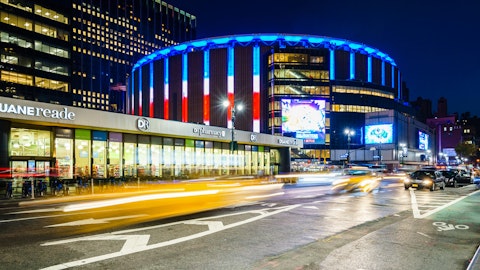And part of this is based on our expectations for higher sell-through across our concert business where we’re pursuing a number of strategies to continue to drive increases over time. We’re focused on maximizing guest experience in our venues. And we’re always exploring innovative ways to use technology to improve this experience, whether it’s through ticketing, next-generation audio or introducing new ways for our guests to buy food and beverages and merchandise, which also benefits our per caps. We’re also focused on enhancing our marketing efforts to better cross-promote across all of our assets and brands, including continuing to develop a deeper understanding of our customers, including leveraging our growing database of millions of customers.
So, we see continued upside on a per-event basis on our expectations around general ticket prices — price increases in the industry, which would have a positive impact on our rental and ticketing fees. So with all this in mind, it is certainly driving increases in per event revenue and profitability is an important aspect for our company’s growth strategy.
Brandon Ross: Okay. And then I may as well ask the elephant in the room question. There’s been a lot of talk about the Penn Station renovation in the past few months. Can you just give an update on any discussions there? And how MSGE might benefit if something did proceed?
Dave Byrnes: We’re obviously invested members of the community here, and we’re deeply committed to improving the Penn Station and — improving Penn Station and the entire surrounding area. And we will continue to collaborate closely with all of the various stakeholders to continue to advance this goal. Within your question, there’s always the question of the theater and the noise around the sale there. And with regard to that, we will continue to pursue all options that make strategic and financial sense. But on the sale, we don’t have anything specific to share today.
Brandon Ross: Got it. Thank you very much.
Dave Byrnes: You’re welcome.
Operator: And your next question comes from the line of Stephen Laszczyk from Goldman Sachs. Your line is open.
Stephen Laszczyk: Hey. Great. Good morning. Maybe just a follow-up on the Christmas Spectacular for you, David. I think you mentioned the group market coming back nicely. I’m curious just the upside to the 185 shows that you currently have on sale for this year. And then maybe a part of that, I believe groups typically come in at a lower average ticket price. How should we be thinking about the puts and takes of pricing for the Spectacular in 2024? Is it still possible to grow revenue per show even as group demand comes back more fully?
Dave Byrnes: Sure, Stephen. Just stepping back, a quick reminder, right, we saw record high revenue for the production this year, over 930,000 guests across 181 shows. For this upcoming holiday run, we’re currently on sale with 185 shows that will run from November 17 through January 1. And while we’re still early in the sales cycle, ticket sales are up over 40% compared to the same time last year, with only the additional four shows on sale. This increase at this point is being fairly equally driven by both group sales and individual ticket sales. And as you mentioned, the increase in group sales is particularly encouraging because this category has seen somewhat of a lagging recovery coming out of the pandemic. And then for individual sales, that increase being driven by both domestic and international tourists as tourism continues to make a more complete return post pandemic.
And we’re also seeing growth in individual sales among local residents. With regard to your ticket pricing piece, you’ve heard me mention, we believe there’s upside over time as we work to more effectively price our inventory. For this fiscal 2024, our effort is to balance ticket pricing with our goal of continuing to drive higher sell-through. So with strong signs of demand from all segments, we’re growing more confident in our opportunity to drive higher sell-through during this upcoming holiday run.
Stephen Laszczyk: Great. Thank you.
Dave Byrnes: You’re welcome.
Operator: And your next question comes from the line of Ben Swinburne from Morgan Stanley. Your line is open.
Ben Swinburne: Thanks. Good morning. Two questions. I guess, first, Dave, can you talk a little bit about the guidance for ’24 on the revenue side. We’re not — we don’t have a lot of long experience with guidance from MSG. And I think we’re trying to get a sense for kind of your visibility, particularly on the bookings side, sort of how much of the year do you have line of sight on, what’s sort of the range of outcomes, some of the puts and takes, would be — appreciate if you could give us some color there.
Dave Byrnes: Sure. So visibility. In terms of concerts, at this point, we have visibility into, call it, roughly over 70% of our bookings goal or target for the year. This would reflect almost 90% of the goal at The Garden. And that’s because typical booking lead time is longer at The Garden roughly six to nine months out. And then at our theaters, we’re more in the two-thirds of the way through our goal because the theaters have a slightly shorter lead time, call it, three to six months. As far as other areas of our bookings business, we recently went on sale with 56 surface Cirque du Soleil holiday shows, both at the theater at MSG and in Chicago, which reflects more than two-thirds of our annual goal for family shows. With regard to special events, the bulk of our special events business takes place in the fourth quarter.



